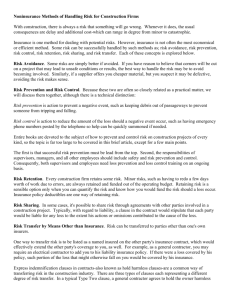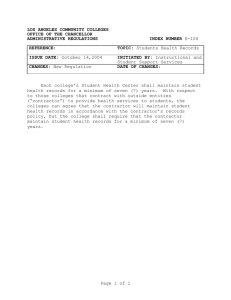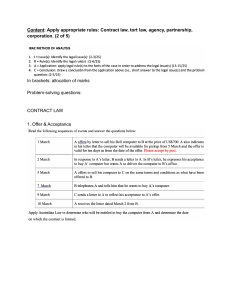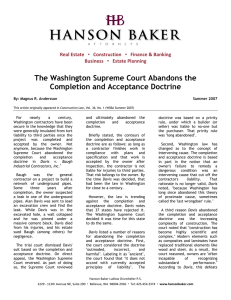Washington Supreme Court Overturns the Completion and Acceptance Rule
advertisement
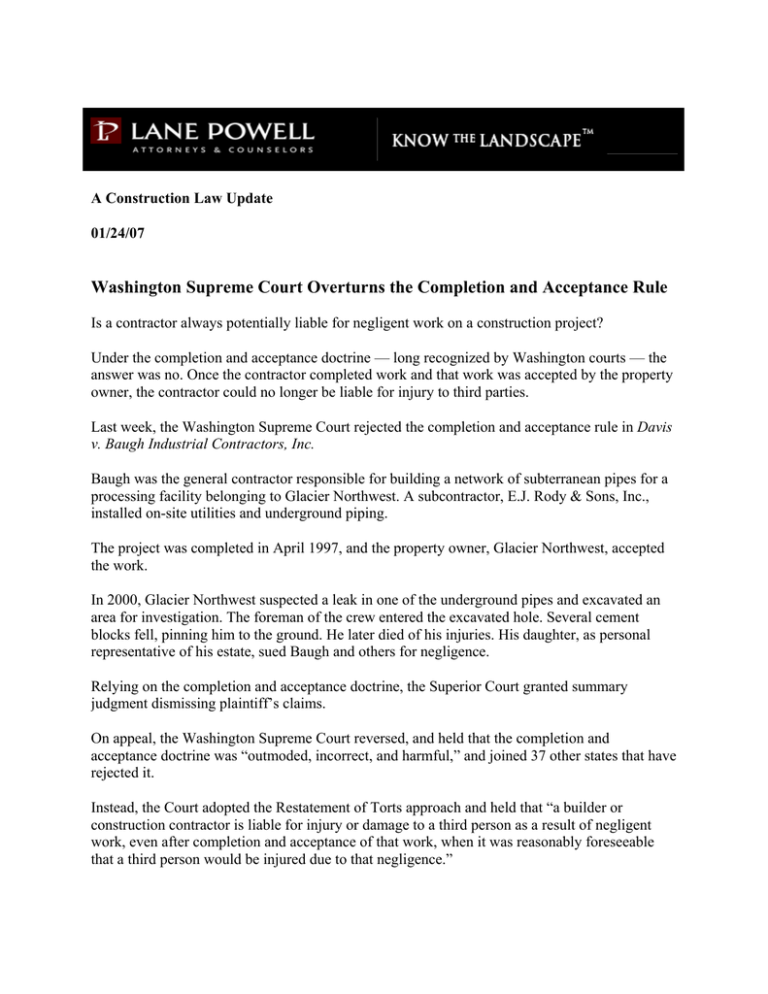
A Construction Law Update 01/24/07 Washington Supreme Court Overturns the Completion and Acceptance Rule Is a contractor always potentially liable for negligent work on a construction project? Under the completion and acceptance doctrine — long recognized by Washington courts — the answer was no. Once the contractor completed work and that work was accepted by the property owner, the contractor could no longer be liable for injury to third parties. Last week, the Washington Supreme Court rejected the completion and acceptance rule in Davis v. Baugh Industrial Contractors, Inc. Baugh was the general contractor responsible for building a network of subterranean pipes for a processing facility belonging to Glacier Northwest. A subcontractor, E.J. Rody & Sons, Inc., installed on-site utilities and underground piping. The project was completed in April 1997, and the property owner, Glacier Northwest, accepted the work. In 2000, Glacier Northwest suspected a leak in one of the underground pipes and excavated an area for investigation. The foreman of the crew entered the excavated hole. Several cement blocks fell, pinning him to the ground. He later died of his injuries. His daughter, as personal representative of his estate, sued Baugh and others for negligence. Relying on the completion and acceptance doctrine, the Superior Court granted summary judgment dismissing plaintiff’s claims. On appeal, the Washington Supreme Court reversed, and held that the completion and acceptance doctrine was “outmoded, incorrect, and harmful,” and joined 37 other states that have rejected it. Instead, the Court adopted the Restatement of Torts approach and held that “a builder or construction contractor is liable for injury or damage to a third person as a result of negligent work, even after completion and acceptance of that work, when it was reasonably foreseeable that a third person would be injured due to that negligence.” The Court also noted that, under RCW 4.16.310, Washington has a statute of repose that “terminates a negligence claim six years after ‘substantial completion of construction,’ even if the injury caused by contractor negligence has not yet occurred.” The net result is that contractors may be liable to third parties for reasonably foreseeable injuries due to negligent work that occurred during the six-year period following completion of the work. For more information, please contact the Construction Law Practice Group at Lane Powell: 206.223.7000 Seattle 503.778.2100 Portland lppc@lanepowell.com www.lanepowell.com We provide the Construction Law Hotsheet as a service to our clients, colleagues and friends. It is intended to be a source of general information, not an opinion or legal advice on any specific situation, and does not create an attorney-client relationship with our readers. If you would like more information regarding whether we may assist you in any particular matter, please contact one of our lawyers, using care not to provide us any confidential information until we have notified you in writing that there are no conflicts of interest and that we have agreed to represent you on the specific matter that is the subject of your inquiry. Copyright © 2007 Lane Powell PC Seattle - Portland - Anchorage - Olympia - Tacoma - London 2

